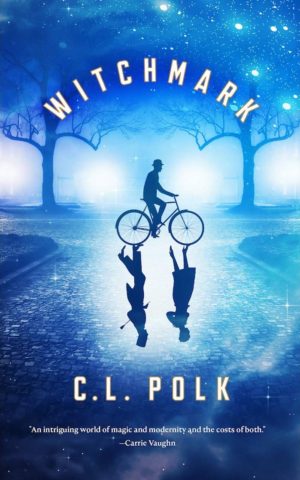In C.L. Polk’s Witchmark, an Edwardian world-next-door fantasy universe is the setting for the story of an on-the-run doctor scion from a noble family, hiding his magical gifts, and getting wrapped firmly in the coils of intrigue, politics and romance.
Miles Singer is a Doctor working in an out of the way hospital, hiding in an unlikely place to run away from his past. A veteran himself, his medical skills gained during his time in a recent war now concluding have transferred to a post-war career helping fellow veterans. His past, however, is why he is working in an impoverished hospital for low wages, living hand-to-mouth in a Tenderloin, and scratching out a living.
For you see, Miles is the scion of a noble family, but with a magical talent that is deemed to be only good for being a battery for his more skillful sister, who is part of the cadre that provides effective control for Aeland’s weather, necessary in a land that would otherwise be wracked by terrible storms. Miles wanted a life to be more than a battery and a breeder for his sister, and so ran away to the army for the war with Laneer and has been hiding every since. But a strange ailment in his hospital, the arrival of a mysterious and alluring gentleman with inquiries of his own, and his sister’s appearance on the scene will shatter his new world…and reveal the underpinnings of his old one.
This is the story of C L Polk’s Witchmark.

The central cast makes for a compelling set of characters to follow. I felt immediately for Miles, caught between trying to help his fellow veterans and stay undetected by the powers that be, and getting caught in the machinations of a greater threat to him, those veterans and his entire nation. I also particularly liked Miles’ sister Grace, who, once she finds where he has been hiding, becomes an important voice in the narrative and an interesting counterpoint to Miles. The elder, talented sister, trying to keep her family’s power from falling to a brutish rival, and alternatively manipulating, negotiating and pleading with Miles to see to his family duty made me feel for her a character as well. The beauty of the novel is in showing a sympathetic portrait of both opposed siblings, even if their goals, hopes and desires are very much orthogonal to each other. The third major character is Tristan, Miles’ love interest. His true nature and his own true goals and plans in Aeland are slowly revealed in the course of the novel, to the point where I hesitate to reveal them. Needless to say, Tristan is much more than what he first appears, and the tension of those revelations connects well with Miles and Grace’s stories.
I also appreciated the setting and worldbuilding, working on a number of levels. The novel is extremely modern and contemporary even as it depicts an Edwardian-era-like world in that it takes some basic assumptions and changes them to suit Polk’s world. The entire core of the romance between Miles and Tristan revolves on a fact, gently revealed, that shifting sexuality is apparently a thing in this world. The idea that a man would take other men as lovers before finally being set to “Settle down” and get married to a woman and have children and a family is, from the context of the novel’s world, the norm. In other words, what our society might call Queer is the societal default. Miles’ romance with Tristan, then, is an act of rebellion, but of a different tone than if the novel was set in our world or a world of our values. It comes across as “you need to settle down and start a family” rather than societal shock and horror and social stigma at a same sex romance.
The worldbuilding of the novel extends into much more: just how magic works, especially since we get revelations through the novel that is news even to Miles, much less the reader. The novel runs a fine line in how it handles magic and magical talents. In this world, ordinary citizens who show magical talent of any kind are locked into asylums, ostensibly for the safety of them and all around them, but the magic users of the noble classes, both Storm Singers like Grace and Secondaries like Miles, are not considered dangerous, quite the contrary. There is some crunchy worldbuilding, exploring how the aristocracy of her world interacts with those below them. Like the aforementioned gender relations difference, Polk’s world also shows a slightly different technological path than our own world. Automobiles have not been invented here, but the bicycle is at a level of popularity unmatched in our own world and history. Traffic flows and traffic rules navigate the interface between bicycles, pedestrians and horse-drawn carriages. We even get something that is a rara avis in fantasy novels: A bicycle chase, which is depicted wonderfully.
Miles’ attempt to escape his fate, combined with the technology, make this feel much more of an Edwardian than a Victorian novel, a subtle distinction when it comes to Gaslamp fantasy, but I think the changing society within her novel is important to its plot and structure, and so that makes this a novel set at a time in her world that is extremely interesting to have stories set in and read about. The author has invented a world that works with the characters and story she is trying to tell.
The style of the novel is a third and strong point of the book. The style is vivid and engages the senses in a way that a lot of authors don’t take advantage of. The novels take advantage of all the senses, and layer in descriptors and things in scenes to build up multidimensional and multisensory scenes that are immersive and drew me into the action and events as a reader.I The writing really reinforces the worldbuilding and character development.
I found Witchmark to be an excellent debut novel, and I look forward to more works from the author.







